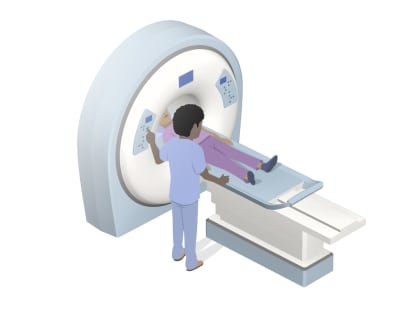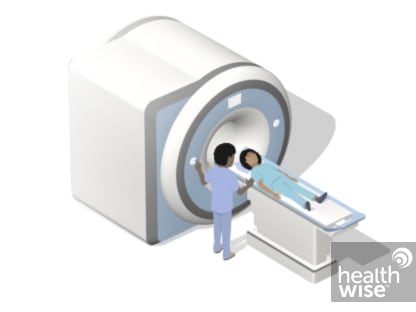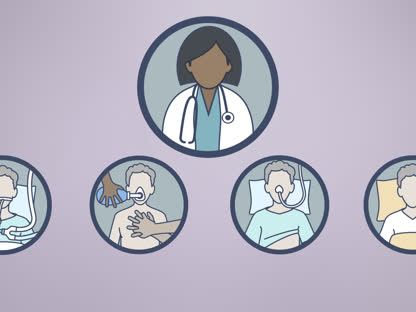Kidney (Renal Cell) Cancer
Condition Basics
What is kidney cancer?
Kidney cancer is the out-of-control growth of abnormal cells in one or both kidneys, Opens dialog. Another name for kidney cancer is renal cancer. "Renal" means having to do with the kidney. Renal cell carcinoma is the most common type of kidney cancer.
What causes it?
Experts aren't sure what causes kidney cancer. But there are certain things that make you more likely to get it. Your risk is higher if you smoke, are very overweight (obese), have high blood pressure, or have certain inherited conditions.
What are the symptoms?
Kidney cancer doesn't usually cause symptoms at first. As it grows, it may cause symptoms, such as blood in the urine, a lump that can be felt in the lower back or belly, or pain in the side or the back.
How is it diagnosed?
You may get tests of your urine and blood. Imaging tests, such as a CT scan, ultrasound, or MRI, can help show kidney cancer. Many cases of early kidney cancer are found during imaging tests that were looking for other problems. A small sample of the kidney may be removed to confirm the diagnosis.
How is kidney cancer treated?
Treatment for kidney cancer is based on the stage, Opens dialog of the cancer and other things, such as your overall health. The main treatment is surgery to remove the cancer. Other options may include using heat or cold to destroy cancer cells (thermal ablation), targeted therapy, Opens dialog, and immunotherapy, Opens dialog.
Health Tools
Health Tools help you make wise health decisions or take action to improve your health.
Symptoms
Kidney cancer doesn't usually cause symptoms at first. As it grows, kidney cancer may cause one or more of these symptoms:
- Blood in the urine. Blood can often be seen with the naked eye. But sometimes it's there in just microscopic amounts, so the urine has to be tested to find the blood cells.
- A lump that can be felt in the lower back or belly.
- Pain in the side or the back.
- Unexpected weight loss.
- A fever that keeps coming back.
- Anemia, Opens dialog.
- Extreme tiredness.
Kidney cancer that has spread to other parts of the body will cause different symptoms, depending on where it has spread. For example, cancer that spreads to the lungs may cause coughing and shortness of breath. Cancer that spreads to the bones may cause bone pain.
What Happens
Kidney cancer that's found early can often be successfully treated. But when it isn't found early, it may spread to other parts of the body, like the lymph nodes, lungs, bones, or liver. After the cancer has spread, how long a person lives usually depends on how much it has spread.
Exams and Tests
To see if you may have kidney cancer, your doctor may do a physical exam. Then your doctor may order one or more tests to look for evidence of cancer. Tests include:
- A urine test.
- Blood tests, such as a complete blood count, Opens dialog and a creatinine test.
- Tests that show pictures of your kidneys (imaging tests), such as:
- A CT scan, Opens dialog. Dye may be injected through a catheter in your vein to make the picture clearer.
- An ultrasound, Opens dialog.
- An MRI, Opens dialog. Dye may be injected in your vein to make the picture clearer.
Many cases of early kidney cancer are found during imaging tests that were looking for some other problem.
If a biopsy is needed to confirm the diagnosis, a small sample of the kidney may be removed to check the cells under a microscope.
Learn more
Watch
Treatment Overview
Treatment for kidney cancer is based on the stage, Opens dialog of the cancer and other things, such as your overall health. The main treatment is surgery to remove the cancer. Other options may include using heat or cold to destroy cancer cells (thermal ablation). If the cancer has spread beyond the kidneys (metastatic cancer), treatment may also include targeted therapy or immunotherapy.
Active surveillance may be an option for some people with very small tumors. Some very small tumors may never grow, and others may grow slowly. You'll have regular checkups and tests but won't have treatment unless the cancer gets worse.
Your doctor will talk with you about your options and then make a treatment plan.
Surgery
Most people with kidney cancer have surgery. If you have early-stage cancer, the doctor may be able to remove all of it. No further treatment may be needed.
The main types of surgery are:
- Partial nephrectomy.
- The doctor removes only the part of the kidney that has a tumor. The rest of the kidney can still work normally. This may be called nephron-sparing or kidney-sparing surgery.
- Radical nephrectomy.
- The doctor removes the whole kidney and the layer of fat around the kidney. The doctor may also remove the adrenal gland and nearby lymph nodes.
Surgery may be done through one cut (incision). This is called open surgery. Or it may be done through several very small cuts. This is called laparoscopic or minimally invasive surgery.
Surgery may not be a good choice for some older adults or people who have serious health problems.
Thermal ablation
This treatment uses heat or cold to destroy (ablate) tumors. Using heat is called radiofrequency ablation. Using cold is called cryoablation.
Thermal ablation may be done when tumors are very small or surgery is not a good choice.
Treatment of metastatic cancer
Surgery is sometimes done to remove cancer that has spread to other parts of the body. Treatment may also include:
- Radiation.
- This uses high-dose X-rays to destroy cancer cells and shrink tumors.
- Immunotherapy.
-
This treatment helps your immune system fight cancer. It may be given in several ways.
- Targeted therapy.
-
These medicines target cancer cells and may cause less harm to normal cells. They help keep cancer from growing or spreading.
Learn more
Watch
Supportive Care
Palliative care is a type of care for people who have a serious illness. It's different from care to cure your illness, called curative treatment. Palliative care provides an extra layer of support that can improve your quality of life—not just in your body, but also in your mind and spirit. Sometimes palliative care is combined with curative treatment.
The kind of care you get depends on what you need. Your goals guide your care. You can get both palliative care and care to treat your illness. You don't have to choose one or the other.
Palliative care can help you manage symptoms, pain, or side effects from treatment. It may help you and those close to you better understand your illness, talk more openly about your feelings, or decide what treatment you want or don't want. It can also help you communicate better with your doctors, nurses, family, and friends.
End-of-life care
It can be hard to live with an illness that cannot be cured. But if your health is getting worse, you may want to make decisions about end-of-life care. Planning for the end of your life does not mean that you are giving up. It is a way to make sure that your wishes are met. Clearly stating your wishes can make it easier for your loved ones. Making plans while you are still able may also ease your mind and make your final days less stressful and more meaningful.
Learn more
Watch
Self-Care
- Take your medicines exactly as prescribed. Call your doctor if you think you are having a problem with your medicine. You may get medicine for nausea and vomiting if you have these side effects.
- Follow your doctor's instructions to relieve pain. Pain from cancer and surgery can almost always be controlled. Use pain medicine when you first notice pain, before it becomes severe.
- Eat healthy food. If you do not feel like eating, try to eat food that has protein and extra calories to keep up your strength and prevent weight loss. Drink liquid meal replacements for extra calories and protein. Try to eat your main meal early. Your doctor also may recommend a special diet.
- Get some physical activity every day, but do not get too tired. Keep doing the hobbies you enjoy as your energy allows.
- Get enough sleep. Try using a sleep mask and earplugs at night, and keep your bedroom dark, cool, and quiet.
- Do not smoke. Smoking can make kidney cancer worse. If you need help quitting, talk to your doctor about stop-smoking programs and medicines. These can increase your chances of quitting for good.
- Take steps to control your stress and workload. Learn relaxation techniques.
- Share your feelings. Stress and tension affect our emotions. By expressing your feelings to others, you may be able to understand and cope with them.
- Consider joining a support group. Talking about a problem with your spouse, a good friend, or other people with similar problems is a good way to reduce tension and stress.
- Express yourself through art. Try writing, crafts, dance, or art to relieve stress. Some dance, writing, or art groups may be available just for people who have cancer.
- Be kind to your body and mind. Getting enough sleep, eating a healthy diet, and taking time to do things you enjoy can contribute to an overall feeling of balance in your life and help reduce stress.
- Get help if you need it. Discuss your concerns with your doctor or counselor.
- If you are vomiting or have diarrhea:
- Drink plenty of fluids to prevent dehydration. Choose water and other clear liquids. If you have kidney, heart, or liver disease and have to limit fluids, talk with your doctor before you increase the amount of fluids you drink.
- When you are able to eat, try clear soups, mild foods, and liquids until all symptoms are gone for 12 to 48 hours. Other good choices include dry toast, crackers, cooked cereal, and gelatin dessert, such as Jell-O.
- If you have not already done so, prepare a list of advance directives. Advance directives are instructions to your doctor and family members about what kind of care you want if you become unable to speak or express yourself.
Learn more
- Cancer: Controlling Cancer Pain
- Cancer: Controlling Nausea and Vomiting From Chemotherapy
- Cancer: Home Treatment for Constipation
- Cancer: Home Treatment for Diarrhea
- Cancer: Home Treatment for Fatigue
- Cancer: Home Treatment for Mouth Sores
- Cancer: Home Treatment for Pain
- Cancer: Home Treatment for Sleep Problems
- Cancer Support: Managing Stress
- Eating Well During Cancer Treatment
- Hair Loss From Cancer Treatment
- Quitting Smoking
Watch
Complementary Treatments
Some people use complementary therapies along with medical treatment. They may help relieve the symptoms and stress of cancer or the side effects of cancer treatment. Therapies that may be helpful include:
- Acupuncture to relieve pain and other symptoms.
- Meditation or yoga to relieve stress.
- Massage and biofeedback to reduce pain and tension.
- Breathing exercises to help you relax.
Talk with your doctor about any of these options you would like to try. And let your doctor know if you are already using any complementary therapies. They are not meant to take the place of standard medical treatment. But they may help you feel better and cope better with treatment.
Learn more
Watch
Getting Support
Relationships take on new importance when you're faced with cancer. Your family and friends can help support you. You may also want to look beyond those who are close to you.
- Reach out to your family and friends.
Remember that the people around you want to support you, and asking for help isn't a sign of weakness.
- Tell them how they can help.
Your friends and family want to help, but some of them may not know what to do. It may help to make a list. For example, you might ask them to:
- Run errands or pick up kids.
- Deliver meals or groceries to your home.
- Drive you to appointments.
- Go to doctor visits with you and take notes.
- Look for help from other sources.
Places to turn for support include:
- Counseling.
- Counseling can help you cope with cancer and the effect cancer is having on your life. Different types of counseling include family therapy, couples therapy, group counseling, and individual counseling.
- Your health care team.
- Your team should be supportive. Be open and honest about your fears and concerns. Your doctor can help you get the right medical treatments, including counseling.
- Spiritual or religious groups.
- These groups can provide comfort and may be able to help you find counseling or other social support services.
- Social groups.
- Social groups can help you meet new people and get involved in activities you enjoy. Focus on activities that bring you comfort, such as spending time outdoors or being with children.
- A cancer support group.
- Cancer support groups offer support and practical advice. You can hear others talk about:
- What it's like to live with cancer.
- Practical ways to manage your cancer treatment and its side effects.
- Ways to cope with your illness.
Learn more
Watch
-
Cancer: Adjusting Over Time, Opens dialog

-
Cancer: Finding Peace in Spirituality, Opens dialog

-
Cancer: Finding Your Strength, Opens dialog

-
Cancer: Understanding Your Feelings, Opens dialog

-
Cancer: When You First Find Out, Opens dialog

-
Cancer: Your Support Network, Opens dialog

-
Counseling for Depression, Opens dialog

Related Information
Credits
Current as of: October 25, 2024
Author: Ignite Healthwise, LLC Staff
Clinical Review Board
All Ignite Healthwise, LLC education is reviewed by a team that includes physicians, nurses, advanced practitioners, registered dieticians, and other healthcare professionals.
Current as of: October 25, 2024
Author: Ignite Healthwise, LLC Staff
Clinical Review Board
All Ignite Healthwise, LLC education is reviewed by a team that includes physicians, nurses, advanced practitioners, registered dieticians, and other healthcare professionals.

















